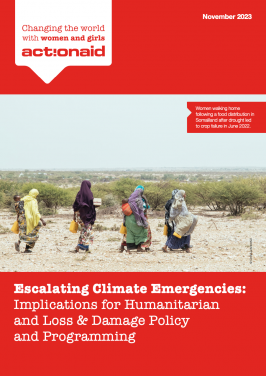Escalating Climate Emergencies: Implications for Humanitarian and Loss & Damage Policy and Programming
ActionAid UK policy brief looking at escalating climate-induced crises and humanitarian sector responses to these, identifying lessons that can inform the future of Loss and Damage programming and policy. The brief draws upon the lived experiences of three women facing the climate crisis within humanitarian contexts across three continents.
Executive summary
Year on year the impacts of climate change are increasing in severity and frequency, leaving a trail of destruction and humanitarian crises. This is laying bare the deficits of climate action and the limitations of humanitarian response. Our global systems are being pushed to breaking point.
This briefing shares the experiences of three women to highlight the following four recommendations for donors and policymakers grappling with climate emergencies:
- Loss and Damage finance needs to be new, additional and at scale and cannot be taken from existing climate, development or humanitarian funds;
- Loss and Damage programming needs to be truly locally-led and enable local groups, particularly youth-led and women-led organisations, to have direct access to funding;
- Responding to climate-induced loss and damage must integrate long-term resilience building and preparedness measures;
- Loss and Damage finance must be flexible and adaptable, particularly in rapidly changing fragile and conflict-affected contexts.

